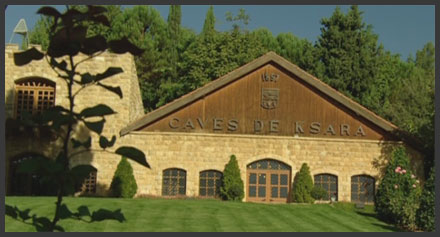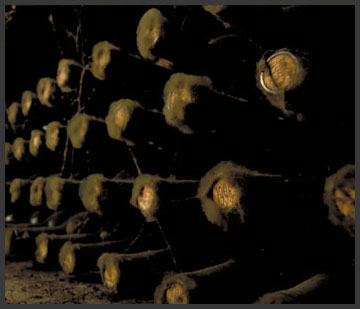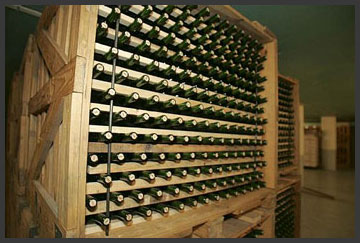Lebanese Wine
Château Ksara invites you to discover the Ksara Caves, where a fine selection of cheese and wine, cold cuts and salad bar are served.
Château Ksara invites you to discover the Ksara Caves, where a fine selection of cheese and wine, cold cuts and salad bar are served.
Opening Hours:
January & February
Monday to Saturday 9.00 am – 8.00 pm (Excluding January 1st & February 9th)
March, November & December
7 days a week 9.00 am – 5.00 pm (Excluding December 25th & Easter day)
From April to October
7 days a week 9.00 am – 6.00 pm (Including public holidays)
For more information, call Ksara Caves at +961- 8- 813495 ext.104.
|
Get the Flash Player to see this player.
|
About Ksara
Over the past decade, Ksara has seen the introduction of new grape varieties that have grown into vines the Bekaa valley has blissfully nurtured. Ksara has also seen developments in technique such as vines cultivation on wires and the attentive  application of advanced science by French oenologists, who watch over the vinification, fermentation and decanting processes.
application of advanced science by French oenologists, who watch over the vinification, fermentation and decanting processes.
Today, the wines of Ksara have a specific character, described as a “rare balance of dry fruitiness, of delicacy and coarseness, and of freshness and vigour.” They are the new image of a deliberately international vineyard, classified today as one of the largest.
Nobody knows when wine was first made in Lebanon, although the Phoenician ancestors of today’s Lebanese were certainly among the earliest winemakers. Later, in the Greco-Roman era, a wine cult flourished, as the ruins of the Temple of Bacchus at Baalbeck in Lebanon’s Bekaa Valley bear eloquent witness.
In the heart of the Bekaa, near Baalbeck, lies the KSARA estate, so named because it was the site of a ksar, or fortress, at the time of the Crusades. The property was acquired by the Jesuit Fathers in 1857 when it was already famed as a vineyard and they perpetuated the tradition of winemaking.
In particular, they pioneered the introduction of high-quality vines in Lebanon. New varietals, enjoying the exceptional climatic conditions in the Bekaa, were cultivated at Ksara and later at Tanail, an estate of 240 hectares (600 acres) which also belonged to the Jesuit Fathers and which sent all its grapes to KSARA’s cellars.
KSARA’s natural wine cellar was a grotto discovered by the Romans who consolidated part of the vault and dug several narrow tunnels from the cave into the surrounding chalk. These tunnels were enlarged to their present size during World War I when the Jesuit Fathers sought to alleviate famine in Lebanon by creating employment.
One hundred men toiled with picks and shovels for four years to complete an underground network of tunnels stretching for almost two kilometres (about 2,000 yards).The temperature in the tunnels is ideal for wine, varying throughout the year from 11 to 13ºC. KSARA came into the hands of its present owners when the Jesuit Fathers decided to sell the estate in conformity with the directives of the Vatican II synod.
Today, KSARA produces wines with strong personalities, achieving a rare condition of dry fruitiness, delicacy and robustness. Wines that leave an imprint on the memory which is as long as their history.
Climate
We have a micro-climate in the Bekaa Valley where our winery and vineyards are at 1200m of altitude. With 240 sunny days, the heat of the summer days is compensated by the freshness of the nights, where a gentle and continuous breeze circulates all along the valley dropping the temperature from 30 to 15°c. These cold nights help the vineyards to support the heat and the drought of summer. We have between 600 and 700 mm of yearly pluviometry, concentrated in Autumn and Winter, in Spring there is less rain whereas in summer and during the growing season we have no more rain which means much less diseases and mushrooms attacks.
We only treat our vineyards with sulphur which is a natural product and no chemicals are needed, and the soil is worked out mechanically and manually.
Harvesting is done by hand and there is no need for selection because the grapes reach ripeness without fear of botrytis rot.
Chairman’s Message
Lebanon was governed by the Ottoman Empire until 1918, then placed under French Mandate from 1920 to 1943 ; it was scarred by 15 years of civil conflict in the latter decades of the 20th century, and rocked with unparalleled ferocity by a war between Israel and Hezbollah over the summer of 2006. This historical record reminds us why Château Ksara’s 150 years of uninterrupted wine production, in times of violent change and upheaval, is such a remarkable achievement. It is also source of immense national pride, for the name and the wine are woven deeply into Lebanon’s modern heritage.
Not only is Château Ksara Lebanon’s oldest winery, it is also one of Lebanon’s oldest and most successful businesses, a household name that is exported to over 30 countries, making new friends wherever it goes.
However, in developing the brand, improving the wines and consolidating a strong position in local and overseas markets, one must not forget Château Ksara’s strong tradition : one that stretches back to 1857, when a determined group of Jesuit monks decided to make a wine like no other.
Video Interview with Zafer Chaoui, Chairman of Chateau Ksara
|
|
Although their wines were mainly made for use in religious services, it was the hard work and vision of these pioneers that laid the foundations for Lebanon’s modern wine industry. They applied their knowledge of science and agriculture to plant French vines when no one in the Bekaa believed they would yield good fruit. They founded a community in Ksara, they discovered and developed two kilometers of Roman caves that proved ideal for the storage of wine, and they created the famous Clos St.Alphonse, a wine which established Château Ksara as a national icon. The Jesuits sold the winery to its current owners in 1973, but one must not forget their contribution to the success and reputation that Château Ksara enjoys today.
War may have slowed Lebanon’s commercial trajectory, but peace, when it came, triggered a brilliant new start. After years of hard work and astute financial investment, Château Ksara has today become one of the most modern wineries in the world. So while the Bekaa continues to be one of the most fertile plots of land on earth, it is complemented by Ksara’s state-of-the-art equipment, its innovative wines and its skilled, professional and dedicated staff. Château Ksara has never been in a better position and faces the future with confidence, optimism and determination.
As chairman since 1991, I can look back with immense pride at the ground-breaking changes we have made in the last 16 years. We too planted grapes that few believed would thrive, but the Bekaa is kind to those who have faith and it is through this faith, both in our wines and in Lebanon, that we seek to perpetuate and build on the legacy of our forebears.
Contact Numbers
* Head Office
Beirut – Lebanon
Tel: 961-1-200715
Fax: 961-1-200716
Email:info@ksara.com.lb
* Me. Charles Ghostine
Managing Director cghostine@ksara.com.lb
* Mr. Elie Asmar
Administration &
Finance Manager easmar@ksara.com.lb
* Mrs. Marie-Louise Azezian Quality & HR Manager mbaboyan@ksara.com.lb
* Mr. Elie Maamari
Export Manager emaamari@ksara.com.lb
* Warehouse
Beirut – Lebanon
Tel/Fax: 961-1-497697
961-1-497797
* Mr. Ramez Saliba
National Sales Manager rsaliba@ksara.com.lb
* Caves of Ksara
Bekaa – Lebanon
Tel.: 961 8 813495
Fax: 961 8 813498
* Mr. James Palgé
Oenologist
jpalge@ksara.com.lb
* Mrs. Rania Chammas
PR Executive rchammas@ksara.com.lb
* Mr. Mounir Lteif
Plant Manager mlteif@ksara.com.lb